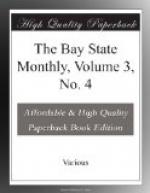Yet still she blushes with new life
In sight of actions fine,
And pales with anguish at the strife
Of evil’s dread design.
She stops to sing her grandest lays
When, in creation’s
heat,
She sees evolved a higher phase
Of life’s fruitions
sweet.
’Twas thus in days of Genesis
When man came forth supreme;
’Twas thus in days of Nemesis
When Love did dare redeem.
And thus ’twill be in future days
When out from spirit-laws,
Shall be brought forth for lasting praise
The ever-great First cause.
Then gladly know this wondrous muse
Who walks the aisles of Time;
And dare not thoughtlessly refuse
Her book of lore sublime.
For in it is the precious force
Of spirit-life divine,
Which even through a winding course
Leads on to Wisdom’s
shrine.
* * * * *
TWO REFORM MAYORS OF BOSTON.
JOHN PHILLIPS.
By The Editor.
The progenitor of the Phillips family in America was the Rev. George Phillips, son of Christopher Phillips of Rainham, St. Martin, Norfolk County, England, mediocris fortunae. He entered Gonville and Caius College, Cambridge, April, 20, 1610, then aged seventeen years, and received his bachelor’s degree in 1613.
[Illustration: JOHN PHILLIPS, THE FIRST MAYOR OF BOSTON.]
After his graduation he was settled in the ministry at Boxted, Essex County, England; but his strong attachment to the principles of the Nonconformists brought him into difficulties with some of his parishioners, and as the storm of persecution grew more dark and threatening, he resolved to cast his lot with the Puritans, who were about to depart for the New World. On the 12th of April, 1630, he with his wife and two children embarked for America in the “Arbella,” as fellow-passenger, with Gov. Winthrop, Sir Richard Saltonstall, and other assistants of the Massachusetts Company, and arrived at Salem on the 12th of June, where, shortly afterwards, his wife died and was buried by the side of Lady Arabella Johnson.
Mr. Phillips was admitted “freeman,” May 18, 1631; this being the earliest date of any such admission. For fourteen years he was the pastor of the church at Watertown, a most godly man, and an influential member of the small council that regulated the affairs of the colony. His share in giving form and character to the institutions of New England is believed to have been a very large one. He died on the 1st of July, 1644, aged about fifty-one years.
The son of the foregoing, born in Boxted, England, in 1625, and graduated from Harvard College in 1650, became in 1651 the Rev. Samuel Phillips of Rowley, Mass. He continued as pastor over this parish for a period of forty-five years. He was highly esteemed for his piety and talents, which were of no common order; and he was eminently useful, both at home and abroad.




